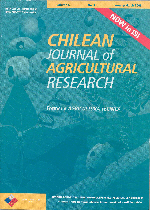
|
Agricultura Técnica
Instituto de Investigaciones Agropecuarias, INIA
ISSN: 0365-2807
EISSN: 0365-2807
Vol. 62, No. 1, 2002, pp. 158-165
|
 Bioline Code: at02016
Bioline Code: at02016
Full paper language: Spanish
Document type: Research Article
Document available free of charge
|
|
|
Agricultura Técnica, Vol. 62, No. 1, 2002, pp. 158-165
| en |
TREPADOR-INIA: GREEN BEAN VARIETY ( Phaseolus vulgaris  L.) FOR GREENHOUSE CONDITIONS. L.) FOR GREENHOUSE CONDITIONS.
Gabriel Bascur B.
Abstract
As a result of the genetic improvement work carried out with
green pod beans by La Platina Regional Research Center, the National Agricultural
Research Institute (INIA) has developed the variety Trepador-INIA. This
new cultivar was obtained by masal selection from a local ecotype, collected
in the province of San Felipe, V Region, Chile, and is recommended as a
greenhouse crop, mainly for rotation between two tomato cycles with the
benefits this implies from a phytosanitary point of view. Its most important
characteristics are its climbing habit and its large flat light green threadless
pod. It is an early cultivar starting production around 65-70 days after
planting with a harvest period of 30-40 days, and high yield potential which
varies between 15-30 t ha
-1
depending if planted in autumn or spring. Its green pod yield, evaluated
in different locations and crop seasons, was significantly better than the
Enriqueta cultivar, which has traditionally been grown in greenhouses. It
is recommended for temperate zones where the greenhouse furnishes the temperature
required by the bean plant, but respecting this condition it can be planted
in any period. Another possibility is to use it outside in the spring-summer
season with stakes or a trellis and get similar yields to those produced
in greenhouses.
Keywords
cultivar, breeding, green pod production
|
| |
| es |
TREPADOR-INIA: VARIEDAD DE POROTO VERDE ( Phaseolus vulgaris  L.) PARA CULTIVO BAJO INVERNADERO L.) PARA CULTIVO BAJO INVERNADERO
Gabriel Bascur B.
Resumen
Como resultado del trabajo de mejoramiento genético
que realiza el Centro Regional de Investigación La Platina en poroto
para producción en fresco, el Instituto de Investigaciones Agropecuarias
ha desarrollado la variedad Trepador-INIA. Esta nueva variedad fue obtenida
por un trabajo de selección masal a partir de un ecotipo local recolectado
en la provincia de San Felipe, V Región, y se recomienda para uso en
invernadero como una alternativa de rotación entre dos ciclos de cultivo
de tomate, con los beneficios que esto significa desde el punto de vista
fitosanitario. Las características más importantes son su hábito
de crecimiento guiador, una agresiva aptitud trepadora, y una vaina larga,
plana y de color verde claro sin presencia de hilo. Es precoz, ya que inicia
su producción a los 65-70 días con un período de cosecha
de 30-40 días, y con alto potencial de rendimiento, que puede variar
entre 15-30 t ha
-1
de vainas, dependiendo si se establece en la estación de otoño
o primavera. Su rendimiento en vaina verde, evaluado en distintas temporadas
y localidades, fue significativamente superior a la variedad Enriqueta,
que ha sido tradicionalmente cultivada en invernadero. Se recomienda para
las zonas donde el invernadero permita obtener las temperaturas adecuadas
que requiere el poroto, por lo que dependiendo de esta condición puede
ser sembrado en cualquier período del año. Otra posibilidad de
uso es al aire libre, en época de primavera-verano con tutores o en
espaldera, y con rendimientos similares a los obtenidos en invernadero.
Palabras-clave
variedad, mejoramiento, producción en fresco
|
| |
© Copyright 2002 - Instituto de Investigaciones Agropecuarias, INIA (Chile)
Alternative site location: http://www.inia.cl/at/agritec.htm
|
|
